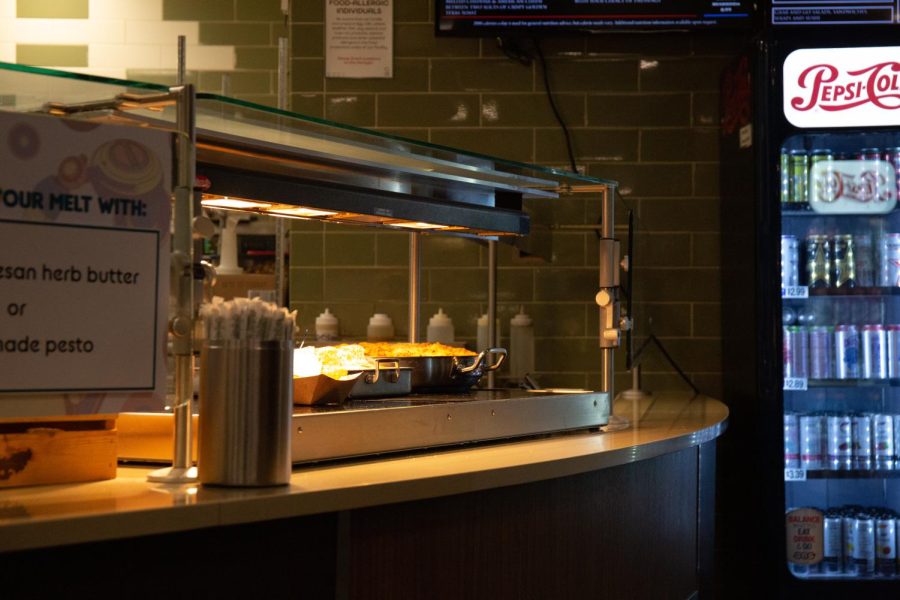U Works to Create Inclusive Dining Options But Barriers Remain for Students with Dietary Restrictions
Miller Cafe at Lassonde Studios on the University of Utah campus on Dec. 6, 2022. (Photo by Julia Chuang | The Daily Utah Chronicle)
December 15, 2022
For many students, whether they live on campus or are required to have a meal plan, the dining options at the University of Utah are their main source of nutrition.
For students who struggle with food allergies, it can be difficult when the U fails to accommodate dietary restrictions, said U student Tess White.
White, a sophomore at the U studying journalism, was recently diagnosed with celiac disease, and said since her diagnosis, her meal plan has gone to waste. While there are labels on food saying if something is gluten-free, there are often very few gluten-free options available, White said, rendering her unable to eat at most of the restaurants on campus.
“My first time going to Kahlert after getting celiac, I was walking around trying to find things that were labeled gluten-free because they do have tablets that specify the food and labels like gluten-free and dairy-free, but I couldn’t find any,” White said.
The labels are unhelpful because even though options are labeled as gluten-free, White said, this doesn’t guarantee there isn’t any gluten in them, which can be dangerous for those suffering from gluten allergies.
“As far as I know, they cannot verify that there is no cross-contamination in any of their food,” White said. “At Miller Cafe, it’s a little bit easier because most of the stuff is prepackaged food, but as far as eating from food that the chefs are cooking on campus, it’s not an option if you are allergic to gluten.”
The U has been working to create places where students who have food allergies and dietary restrictions, like celiac disease, can go, said Chuck Weaver, resident district manager for the U dining services. One example is the G8 stations, now being called “Made Without,” in the Peterson Heritage Center and Urban Bites.
“[G8] focuses on the [eight] major allergies and that includes a gluten allergy,” Weaver said. “The student can go to a G8 area and know that none of that food in that station is made with gluten.”
Dining services at the U will also purchase more gluten-free and allergen-free food and condiments over foods containing allergens for students with dietary needs to more create inclusive spaces for these students, said Weaver.
“If there’s ever a choice in products, we pull in the one that doesn’t have the food allergy,” Weaver said. “If there’s two of them [that] are salad dressing, one made with gluten, one is made without, we purchase the one made without.”
For students who are confused about what food options meet their dietary restrictions, there is always someone present to help guide them to minimize confusion and help them dine safely, said David Ko, associate director for dining services at the U.
“There’s always going to be some sort of supervisor presence in that facility where students can provide feedback and ask questions about menu items or the food being served,” Ko said. “There’s never a situation where we discourage students from doing that, and the goal is to eliminate as many barriers to entry in order to do that as possible.”
Despite these steps toward being food inclusive, the U dining services are still unable to guarantee that any food served is truly gluten-free, but extensive precautions are being taken to reduce this cross-contamination at their gluten-free and allergen-free stations as much as possible, Weaver said.
“If you ever go to [a G8], they have purple handled utensils, it has its own dishwasher,” Weaver said. “It’s a separation of everything to really prevent [cross-contamination]. That’s really why we built that allergen-free area.”
Weaver encourages those with dietary restrictions to give feedback and recommendations to the U dining services and said they are always trying to improve the dining options here at the U.
“The student is their own best advocate,” Weaver said. “We’re very approachable. Everybody’s aware of food allergies, and we just want to make it the best experience possible.”









